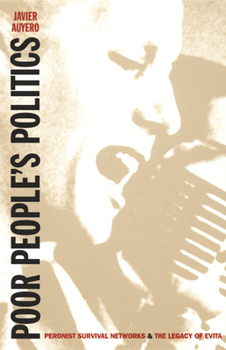Poor People's Politics: Peronist Survival Networks and the Legacy of Evita
Select Format
Select Condition 
Book Overview
"Political clientelism" is a term used to characterize the contemporary relationships between political elites and the poor in Latin America in which goods and services are traded for political favors. Javier Auyero critically deploys the notion in Poor People's Politics to analyze the political practices of the Peronist Party among shantytown dwellers in contemporary Argentina.
Looking closely at the slum-dwellers' informal problem-solving networks, which are necessary for material survival, and the different meanings of Peronism within these networks, Auyero presents the first ethnography of urban clientelism ever carried out in Argentina. Revealing a deep familiarity with the lives of the urban poor in Villa Para so, a stigmatized and destitute shantytown of Buenos Aires, Auyero demonstrates the ways in which local politicians present their vital favors to the poor and how the poor perceive and evaluate these favors. Having penetrated the networks, he describes how they are structured, what is traded, and the particular way in which women facilitate these transactions. Moreover, Auyero proposes that the act of granting favors or giving food in return for votes gives the politicians' acts a performative and symbolic meaning that flavors the relation between problem-solver and problem-holder, while also creating quite different versions of contemporary Peronism. Along the way, Auyero is careful to situate the emergence and consolidation of clientelism in historic, cultural, and economic contexts.
Poor People's Politics reexamines the relationship between politics and the destitute in Latin America, showing how deeply embedded politics are in the lives of those who do not mobilize in the usual sense of the word but who are far from passive. It will appeal to a wide range of students and scholars of Latin American studies, sociology, anthropology, political science, history, and cultural studies.
Looking closely at the slum-dwellers' informal problem-solving networks, which are necessary for material survival, and the different meanings of Peronism within these networks, Auyero presents the first ethnography of urban clientelism ever carried out in Argentina. Revealing a deep familiarity with the lives of the urban poor in Villa Para so, a stigmatized and destitute shantytown of Buenos Aires, Auyero demonstrates the ways in which local politicians present their vital favors to the poor and how the poor perceive and evaluate these favors. Having penetrated the networks, he describes how they are structured, what is traded, and the particular way in which women facilitate these transactions. Moreover, Auyero proposes that the act of granting favors or giving food in return for votes gives the politicians' acts a performative and symbolic meaning that flavors the relation between problem-solver and problem-holder, while also creating quite different versions of contemporary Peronism. Along the way, Auyero is careful to situate the emergence and consolidation of clientelism in historic, cultural, and economic contexts.
Poor People's Politics reexamines the relationship between politics and the destitute in Latin America, showing how deeply embedded politics are in the lives of those who do not mobilize in the usual sense of the word but who are far from passive. It will appeal to a wide range of students and scholars of Latin American studies, sociology, anthropology, political science, history, and cultural studies.
Format:Paperback
Language:English
ISBN:0822326213
ISBN13:9780822326212
Release Date:January 2001
Publisher:Duke University Press
Length:272 Pages
Weight:1.00 lbs.
Dimensions:0.6" x 6.0" x 9.0"
Customer Reviews
2 ratings
Pathbreaking!!
Published by Thriftbooks.com User , 24 years ago
Where should we shelve this book? Does it matter? Should it be in LAtin American Studies? Should it be in sociology? The people that auyero portraits with the skill of s craftman could not be Argentinean. They could be in every day New York at the kitchen soups, they could have lived in the old days of italian immigration. Rather that concentrating in names and places the aim of this book is to find the ways in which every day people make sense of their lifes while being in a situation of opression; to find the ways in which there could be resistance inside acts catalogues as domination and at the same time maintain the idea of domination intact. This book os a must for every person interested in Argentina, for every person interested in LAtin America, for every people ineterested in the sociological analysis of everyday life and political domination. Integrating theory and empiria, this book is a readable one, even though it doesn't run away from theory. As a grad student and an adjunct teacher myself, I think it could be a great undergrad and grad textbook.
Ethnography at its best!!
Published by Thriftbooks.com User , 24 years ago
This is a truly outstanding work. Hardly anyone did the kind of fieldwork Auyero did, hardly anyone illuminates the way in which the poor in Argentina manage to solve their everyday survival problems and, in the process, become subordinated in a powerful domination network. I would recommend this book not only to those interested in Latin American politics but also to those who want to know what a theoretically-inspired ethnography looks like.





